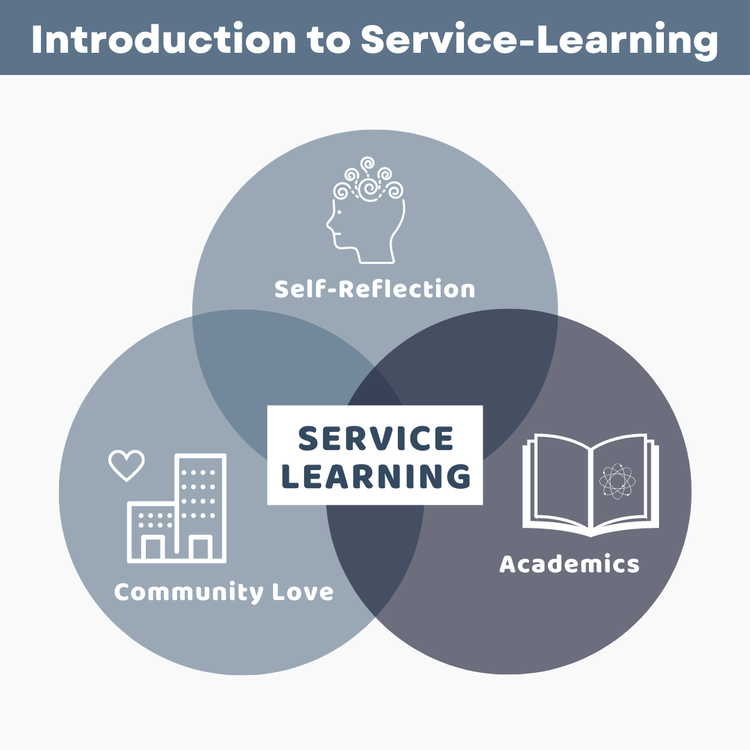Service: the action of helping or doing work for someone.
Learning: the acquisition of knowledge or skills through experience, study, or presentation.
Service-Learning is form of experiential education where learning occurs through a cycle of action and reflection as leaders seek to achieve real objectives for the community and deeper understanding and skills for themselves. Vanderbilt University
Professional Service-Learning is an approach to adult-education that links service-leadership and project management to deep inquiry and reflection. It's a process for nonprofit and community leaders who want to learn, participate and lead to improve conditions in their neighborhoods. DevoCenter Inc.
A
Action: the process of doing something to achieve a goal.
Action Plan: a detailed strategy outlining activities needed to reach one or more goals.
Advocate: a person who publicly supports or recommends a particular cause.
Advocacy: the process of creating awareness of or promoting action on an issue of public service.
Assessment: an ongoing process to evaluate performance and measure program, project or organizational progress to goal, in order to adjust and set future targets.
B
Brand Narrative: a concise, streamlined story that acts as the platform for an organization's marketing and communications. Brandeis University
C
Collaboration: the ability to work with others towards a common goal.
Community: a group of people connected by geography, culture, situation, and/or need.
Community Partnership: an association of two or more people or entities who agree to work together for mutual benefit.
Community Resources: people, funds, and goods available to participants in order to carry out their plan of action.
Community Service: a voluntary act that benefits others.
Community Service Leader: someone who organizes and guides others, facilitates problem-solving and decision-making, and takes action to benefit their neighborhood.
D
Documentation: Evidence of performance or learning.
E
Education for Sustainability: a transformative learning process that promotes an understanding of the relationship between economic prosperity, responsible citizenship and the health of living systems. EfS links this knowledge with inquiry and action to help leaders build a healthy future for their communities and the planet. The Cloud Institute for Sustainability Education
Evaluation: a periodic look at a program inputs and outputs to see how successfully it is achieving its goals.
F
Feedback: a response to a particular portion of the project.
I
Impact: a strong effect on someone or something.
Inquiry: an act of asking for information, requiring leaders to engage in active learning by generating questions, seeking answers, and exploring complex ideas.
L
Leadership: the action of guiding a group of people or an organization.
Learning by Teaching: helps leaders comprehend and deepen new knowledge by preparing a presentation for stakeholders.
M
Meaningful Service: time spent impacting the community in a positive way, with an understanding of purpose and personally relevant activities.
Mindfulness: maintaining an awareness of our intentions, thoughts, and feelings from a position of curiosity and kindness.
O
Outcomes: changes that occur as a result of actions.
P
Project: an undertaking, carried out individually or collaboratively and possibly involving research or design, that is planned to achieve an outcome.
Project Management: the process of leading the work of a team to achieve all goals with available resources.
R
Reflection: a thoughtful, serious looking back at one's experiences, individually or as a group, as part of future planning.
S
Self-Reflection: contemplation about one’s personal values, mindsets, behaviors, and desires.
Servant Leadership: is a leadership philosophy, embedded in a set of behaviors and practices that place a primary emphasis on the well-being of those being served. Center for Servant Leadership
Socratic Method: a form of cooperative argumentative dialogue between individuals, based on asking and answering questions to stimulate critical thinking and to draw out ideas and underlying presuppositions.
Stakeholder: an individual or entity who is invested in or impacted by the outcome of a program or project.
Storytelling: the interactive art of using words and actions to reveal the elements and images of a story while encouraging the listener’s imagination. National Storytelling Network




















